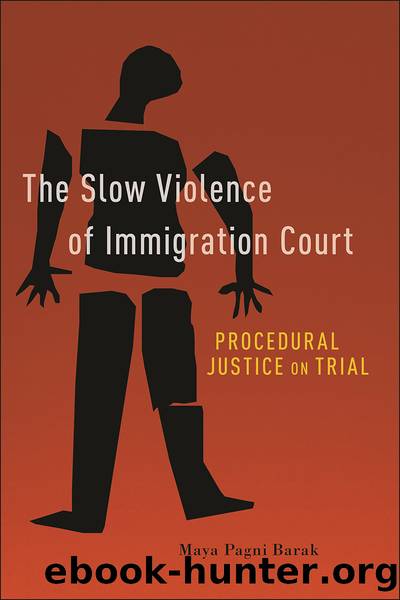The Slow Violence of Immigration Court by Maya Pagni Barak;

Author:Maya Pagni Barak; [Barak, Maya Pagni]
Language: eng
Format: epub
Tags: POL028000 POLITICAL SCIENCE / Public Policy / General
Publisher: New York University Press
Compliance, Fairness, and Legitimacy
Most immigrants I interviewed were deeply disillusioned with the justice systems in their countries of origin. For many, the promise of the rule of law was in part what brought them to the United States. It is also what fueled their desire to stay. Compared with the perceived lawlessness of Central America, strict adherence to and enforcement of the law were welcomed by many, with one glaring exception: their own deportation orders.
Again, nearly all the immigrants I interviewed were either in violation of an existing deportation order when we spoke or planned to violate the law if ordered deported in the future. Indeed, immigrants were wholly unsatisfied with outcomes of deportation for themselves and their family members regardless of how procedurally fair they found their immigration court experiences or how much they appreciated the rule of law in the United States. Many explained that, although they prided themselves on abiding by the law generally, this was not an option in the context of immigration law, which is simply not compatible with most immigrantsâ needs.
In explaining this apparent contradiction, most immigrants ultimately questioned the substantive fairness of U.S. immigration law overall. For example, recall Gloria from chapter 3, herself an undocumented immigrant. Gloria and her husband fought his deportation case in immigration court for three years, at which point he was ordered deported. Fully aware of the consequences, Gloriaâs husband chose to remain in the United States illegally. Years later, after getting into a car accident, he was subsequently arrested, detained, and forcibly deported. Reflecting on both deportations, Gloria spoke highly of all those involved. As she explains: âWell, [judges and attorneys] study the laws. They study whatâs right. Theyâre just following whatâs right, so you have to respect their decisions.â Although her husbandâs deportations were correct in a legal sense, Gloria felt they were not right in a moral sense or what was best for their family. When we spoke, Gloriaâs husband was in the process of planning his illegal return to the United States.
Like Gloria, Rita characterized her deportation hearing as rather fair. She noted that her judge was stern but that he treated her much better than she had expected. Yet Rita said that she could not handle even the mere thought of deportation. If she were to comply with such an order, she would have to leave her husband, an undocumented Mexican immigrant, and her two children, one of whom was a U.S. citizen, behind. âIf I am ordered deported,â she shares, âIâll die.â For individuals like Gloria and Rita, the deportation of immigrants without serious criminal convictions is substantively unfair and always will be.
So what does substantively fair immigration law look like? Although the specifics varied, immigrants unanimously agreed that it involves the ability to live and work in the United States. As Freddy comments, âThere are fair things and unfair things about the [U.S. immigration system].â He explained that substantively fair immigration law would include permanent relief from deportation for families, noting that âthousands of people have been separated from their children.
Download
This site does not store any files on its server. We only index and link to content provided by other sites. Please contact the content providers to delete copyright contents if any and email us, we'll remove relevant links or contents immediately.
The Secret History by Donna Tartt(18151)
The Social Justice Warrior Handbook by Lisa De Pasquale(11950)
Thirteen Reasons Why by Jay Asher(8447)
This Is How You Lose Her by Junot Diaz(6430)
Weapons of Math Destruction by Cathy O'Neil(5825)
Zero to One by Peter Thiel(5487)
Beartown by Fredrik Backman(5348)
The Myth of the Strong Leader by Archie Brown(5236)
The Fire Next Time by James Baldwin(5015)
How Democracies Die by Steven Levitsky & Daniel Ziblatt(4950)
Promise Me, Dad by Joe Biden(4907)
Stone's Rules by Roger Stone(4852)
100 Deadly Skills by Clint Emerson(4684)
A Higher Loyalty: Truth, Lies, and Leadership by James Comey(4546)
Rise and Kill First by Ronen Bergman(4542)
Secrecy World by Jake Bernstein(4387)
The David Icke Guide to the Global Conspiracy (and how to end it) by David Icke(4376)
The Farm by Tom Rob Smith(4320)
The Doomsday Machine by Daniel Ellsberg(4241)
